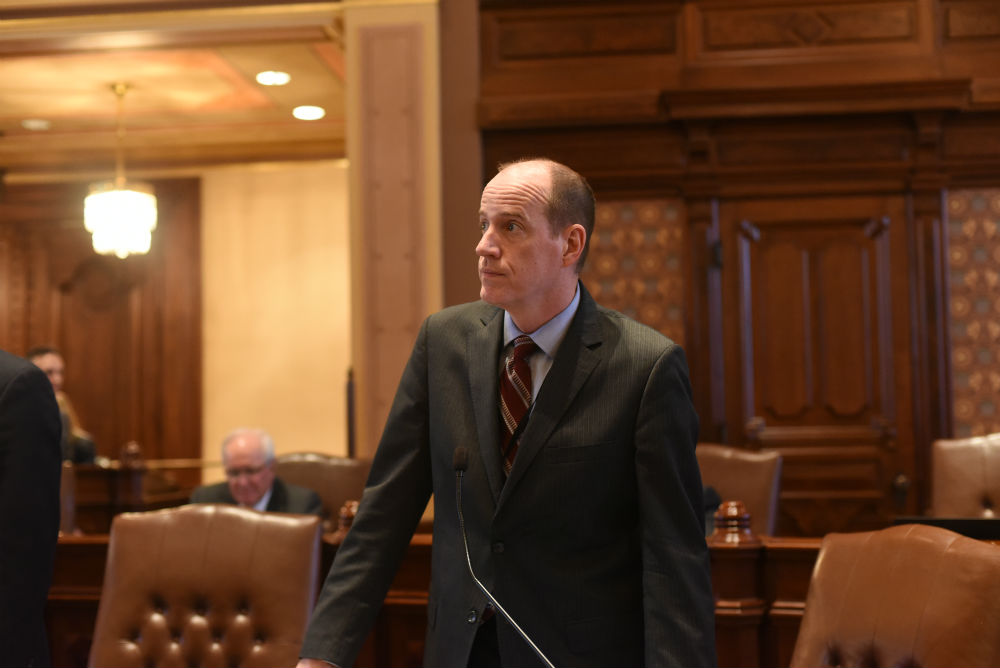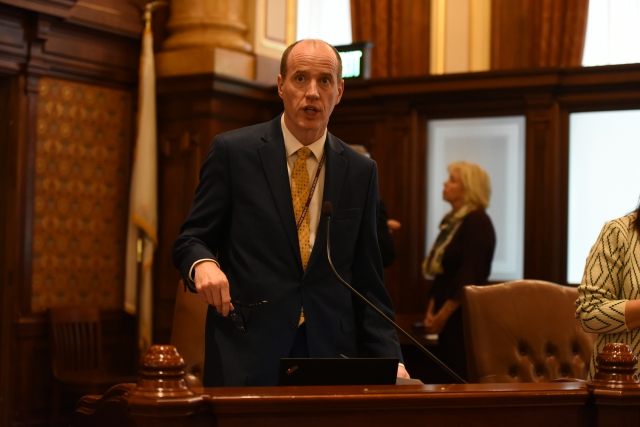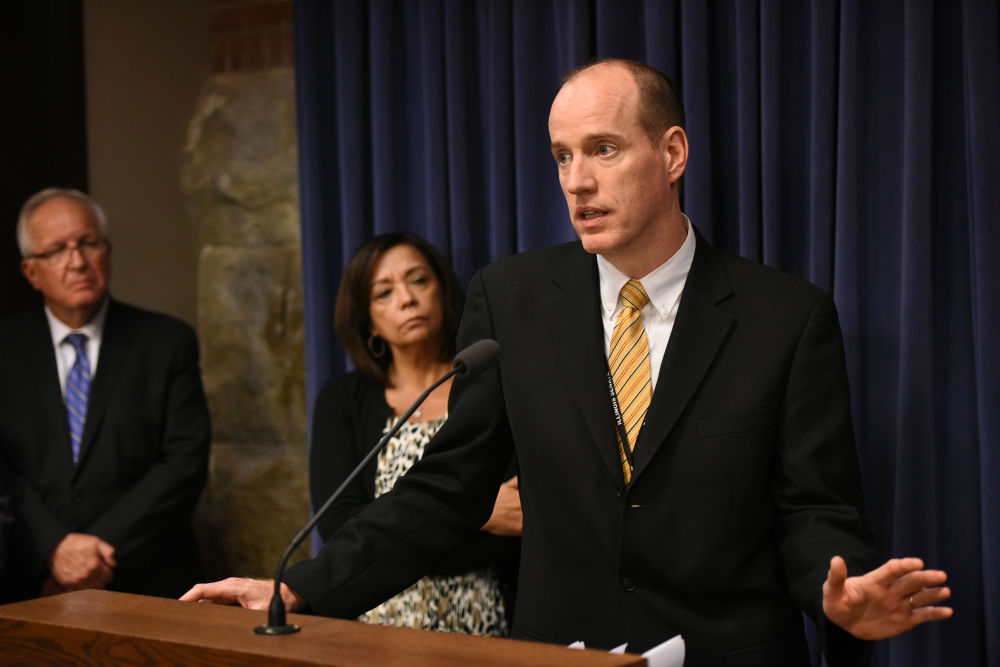- Details
- Category: Press Releases
 CHICAGO – State Senator Bill Cunningham is urging residents to file complaints with the Office of the Attorney General if they experience price-gouging, scams or other unfair practices related to the COVID-19 outbreak.
CHICAGO – State Senator Bill Cunningham is urging residents to file complaints with the Office of the Attorney General if they experience price-gouging, scams or other unfair practices related to the COVID-19 outbreak.
“We all have a part to play in preventing bad actors from using this pandemic to exploit others,” said Cunningham, a Democrat who represents portions of Chicago and the southwest suburbs. “I encourage anyone who has information on price gouging or scams to report it to the Attorney General’s Office.”
Governor JB Pritzker issued an executive order last week to prohibit price gouging related to the coronavirus epidemic. Attorney General Kwame Raoul’s office is enforcing the order and directing businesses to maintain fair pricing practices – particularly on items public health officials are recommending to help limit the spread of COVID-19.
The Attorney General’s office is also monitoring pricing on online retail platforms, such as Amazon and eBay.
“During this challenging time, no one should have to worry about being taken advantage of,” Cunningham said. “I’m glad to see that the governor and the attorney general are taking an aggressive approach to stopping these practices.”
More information about price gouging and scams related to coronavirus is available at illinoisattorneygeneral.gov.
- Details
- Category: Press Releases
 CHICAGO – Area residents are encouraged to stop by State Senator Bill Cunningham’s district office Saturday, Feb. 29 and Saturday, March 21 to participate in the Chicago Multiethnic Prevention and Surveillance Study (COMPASS) through the University of Chicago.
CHICAGO – Area residents are encouraged to stop by State Senator Bill Cunningham’s district office Saturday, Feb. 29 and Saturday, March 21 to participate in the Chicago Multiethnic Prevention and Surveillance Study (COMPASS) through the University of Chicago.
COMPASS is a long-term research project aimed at better understanding the connections between genetics, environment, health behaviors and chronic diseases, including cancers, in the Chicago area. The study’s findings will be used to inform public policy and develop strategies for further research.
Cunningham is hosting the event along with State Rep. Fran Hurley, State Rep. Kelly Burke and Alderman Matt O’Shea.
On both days, the COMPASS mobile unit will be parked in front of Cunningham’s office at 10400 S. Western Ave. in Chicago from 9:00 a.m. until 2:00 p.m. Participants are eligible to receive $50 in Visa gift cards.
“This study is going to help us better understand health outcomes in the city of Chicago and will shed some light on suspected cancer risks here in the 19th Ward,” said Cunningham, a Democrat who represents portions of Chicago and the southwest suburbs. “I encourage everyone available to participate in the study and help us learn more about how we can improve public health.”
Participation in COMPASS includes:
- Completion of an online consent process;
- Completion of three online survey modules;
- Contribution of physical measurements as well as blood, urine and saliva samples; and
- Optional participation in home radon monitoring.
Study participants are encouraged to fill out the consent form and surveys prior to arriving to save time. Those forms can be accessed at https://compass.uchicago.edu.
Questions about COMPASS can be directed to research specialist Andy Craver, who can reached at
- Details
- Category: Press Releases

The governor’s proposal includes several increases for education at all levels, including increases of $50 million for the early childhood block grant and $350 million in evidence-based funding for K-12 schools throughout the state.
“I’m glad to see that Governor Pritzker is continuing to maintain his commitment to making a high quality education available for students at all levels,” said Cunningham, a Democrat who represents portions of Chicago and the southwest suburbs. “These funding increases would be a significant win for students and educators throughout the state.”
College affordability was also a focus of the budget proposal, which included increases of $50 million for the MAP program and $35 million for the AIM HIGH program. Both programs provide financial assistance for low- and middle-income students who wish to pursue a post-secondary education.
“Rising tuition and fees have placed a college education out of reach for far too many students in our state,” Cunningham said. “We need to ensure that every student who wants to pursue a degree will have the opportunity to do so, and increasing funding for these programs is a great step toward that goal.”
Cunningham also expressed his support for the proposed investments in public safety, including $17.2 million to fund three Illinois State Police cadet classes that will graduate an estimated 255 troopers.
“The work of our state troopers is instrumental in making Illinois a safe place to live, and adding three new classes to their ranks will help them better protect and serve the people of Illinois,” Cunningham said.
- Details
- Category: Press Releases
 CHICAGO – The school districts of Evergreen Park and Worth will be eligible to receive property tax relief thanks to a state grant program, State Senator Bill Cunningham announced Friday.
CHICAGO – The school districts of Evergreen Park and Worth will be eligible to receive property tax relief thanks to a state grant program, State Senator Bill Cunningham announced Friday.
“One of the top issues in our state right now is the need to find new solutions to our sky high property tax rates,” said Cunningham, a Democrat who represents portions of Chicago and the southwest suburbs. “This program is a critical step toward bringing those rates down in some of the highest taxed school districts in Illinois.”
Evergreen Park Community High School District 231 will receive $668,831 in grant funding while Worth School District 127 will receive $866,277.
The grants will be distributed through the Illinois State Board of Education’s Property Tax Relief Grant program, which seeks to ease the burden on residents of heavily taxed school districts. The amount of the grant then becomes a permanent part of the districts’ yearly base funding amounts going forward.
“The funding available through these grants is going to be a major boost for these school districts for years to come,” Cunningham said. “This is going to help us start shifting some of the school funding burden away from local taxpayers and onto the state.”
More information about the Property Tax Relief Grant is available at https://www.isbe.net/proptaxrelief.
More Articles …
Page 32 of 86



